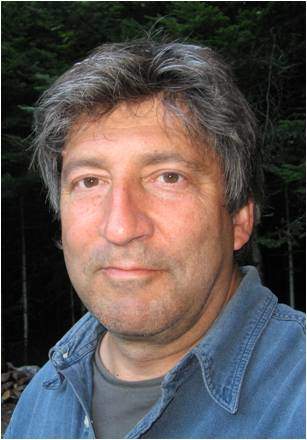Forty Shades of… “Less Brown?”
by Brian Czech
Various subjects compete for this week’s Daly News, coming on the heels of the Eastern Economic Association conference in Philadelphia. “Forty Shades of Green” comes to mind, with all that we hear these days about “greening” the economy. Green jobs, green technology, green sectors… even “green growth.”
Sure enough, at the outset of the EEA conference was a talk on “Green Consumerism.” However, I took special note of the subtitle, “A Path to Sustainability?” The most noteworthy part was the question mark. In a political economy seemingly drunk on green beer, the question mark suggested some sobering skepticism.
I wondered if the question mark was just a typo. After all, this was a conference of professional economists, widely known for denying any conflict between economic growth and environmental protection. Yet the authors, Paula Cole and Valerie Kepner, described in some detail the inanity of spending our way into a sustainable economy, as well as the shenanigans pulled with the word “green.” They questioned the use of “green” to describe any kind of consumption. They concluded that “greening” an economy really entailed a lessening of consumption.
So maybe it’s time to employ another portion of the color spectrum in reference to economic growth. If green sends the wrong message, perhaps “brown” is the word. Instead of green growth, brown bloating.
Some consumable goods are less brown than others – think Honda vs. Hummer – but even a unicycle requires natural resources for its production. Manufacturing the unicycle entails pollution, too. It just doesn’t square to call an expanding unicycle sector a “green” phenomenon. Even compared to Hummers, unicycles are less brown, not green.
The service sectors fit in with the browning process of economic growth. From driving trucks (quite a brown service) to answering phones (less brown, on the surface), material inputs and pollution are part of the deal. We also have to remind our green beer-drinking friends that much of the phone answering is in service to the trucking sector. In more general terms, the “information economy” is an economy where growing quantities of information feed the already-brown sectors. If we don’t remember this, the Green Sheen Machine will continue to get away with talk of “de-materializing” the economy, lulling citizens and policy makers into leaving environmental concerns for tomorrow, while we experiment with “greening” our growth today.
We shouldn’t be surprised if they start talking about “green population growth” for green jobs and green consumerism. After all, cheaper labor and more consumers is what the corporate marketer wants. So we also have to remind our green-beer guzzlers that Hummer drivers and unicycle riders alike – indeed any producer or consumer of any good or service – must be fed, clothed, and sheltered. Population growth, which is often encouraged or defended for the sake of economic growth, entails the production and consumption of more food, clothing, and shelter. It’s not always and everywhere bad, but it’s never, nowhere green.
What about technological progress? The development of new technology in the brownest sectors might slow the slide toward dirty-coal black, but it doesn’t move us to the green part of the spectrum. That is because of the overlooked, tight linkage of research and development with economic growth at pre-existing, admittedly brown levels of technology. This ballooning, brownward spiral is more fully described here. New technology can be a very good thing, but in the service of economic growth, it does no better than lessen the rate of browning.
From the supply side and the demand side, then, economic growth starts with a tinge of brown and gets browner by the unit. We might call this the principle of increasing marginal brownness. If we must get “green” into the terminology, we may refer to economic growth as exhibiting the principle of diminishing marginal greenness.
But back to the Eastern Economic Association… Although I was right about the intent of Cole and Kepner, I turned out to be wrong about many other authors at the conference. I thought that, aside from a few strays, they would all be pumping their growth fists, “green” or not. Instead, almost all of the economists I spoke with – and I spoke with dozens – agreed that there is in fact a fundamental conflict between economic growth and environmental protection! These were professional economists, economics professors, and top-notch grad students in economics. They agreed that in large, wealthy economies, a steady state economy has become a more appropriate goal than economic growth.
“Prove it,” you say? I’ll do just that, next month in The Daly News.







Brian,
Great post! And well-written too. I think this bit is really the heart of the matter: “They questioned the use of “green” to describe any kind of consumption. They concluded that “greening” an economy really entailed a lessening of consumption.” And isn’t this also the message behind thinking of the problem of growth in terms of thermodynamics? That ultimately there’s a limit to efficiency? (Not to mention when net growth overwhelms per unit efficiency in the first place). Joshua Nelson blogged about this topic nicely: http://steadystaterevolution.org/decoupling-demystified/
I remember reading “Natural Capitalism”, and coming away thinking of an production/consumption loop that was somehow divorced from natural resources – think green buildings, biodegradable packaging, solar energy, and so on. But that’s not really true, right? There’s a limit to the growth of even THAT kind of economy – as the production of anything, no matter how efficient, is still tied to resource use somehow.
The use of “green”, in that context, is kinda dangerous in a certain way – in that it could lull us into believing that consumption and cultural change aren’t really necessary. That it’s an innovation problem best left to entrepreneurs, Silicon Valley, and the GreenBiz.com folks. Am I on the right track here? (Not that they’re not key movers, too – just not the only answer.)
Thanks for launching this series – really looking forward to hearing more from Dr. Daly, yourself, and others. Your work makes a big difference, believe me, even if it hasn’t made the mainstream yet!
Scott
There’s a marvellous cartoon by Ashleigh Brilliant.
I don’t know how to post an image, so here’s the punchline: “Cheer up, things are getting worse at a slower rate!”.
Yes, and yes, and yes!
However, a question: is all human life “brown”? I understand the need to redress the balance, make a statement against nauseating greenwash. However: human life by definition requires resources. Surely we are not against “moderate” consumption thereof for survival and small pleasures!
Being a communicator by trade, I worry about the need to make “steady-state” (or as I prefer “equilibrium”) economy attractive to people and not to play into the stereotype of dour austerity.
Enjoyed the post and look forward to more from The Daly News.
I suspect most of us reading at this site are here because we are convinced that economic growth is unsustainable. What would be really helpful is more commentary on the transition from our current growth paradigms to a steady state paradigm. I did read Herman Daly’s 10 steps to sanity that were published a while back in the midst of the economic implosion. That was very useful. What would be nice is further amplification (speculation) on how the transition could happen and what dislocations it would involve.
What really troubles me is that I can’t imagine the system making the changes that need to be made at the paradigm level. If that’s true, are we simply waiting for current system to crash and burn so we can start over?
Brian, great post! I love this new blog and I am so happy to see all the readers and comments. I am happy to hear that you ran into so many economists that were willing to admit the conflict between economic growth and ecological limits. Did you get any to sign the CASSE position? That would be a real victory, yea?!
Scott, thanks for the shout out to my post!
Cheers,
Joshua
Of course I think Brian is spot on. It still amazes me that the Ecological Society of America continues their denial and even suggests that population growth is not a major worry and that economic growth can be good.
toodles – randy
Bravo, Brian. You guys are really doing some great work here. My compliments on all the energy, great new website, organization and promotion of this concept.
Dave Gardner
Producer/Director of the documentary
Hooked on Growth